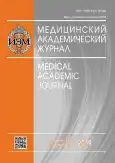EXPERIMENTAL SUBSTANTIATION OF THE IMMUNOSTIMULATING EFFECT OF BRANCHED-CHAIN AMINO ACIDS UNDER STRESS
- Authors: Trushina EN1, Timonin AN1, Ryger NA1, Mustafina OK1, Kuznetsov VD2
-
Affiliations:
- Federal Research Centre of Nutrition, Biotechnology and Food Safety, Moscow
- First Moscow State Medical University named after I.M. Sechenov, Moscow
- Issue: Vol 19, No 1S (2019)
- Pages: 182-184
- Section: Articles
- Published: 15.12.2019
- URL: https://journals.eco-vector.com/MAJ/article/view/19389
- ID: 19389
Cite item
Abstract
The aim is to study the effect of branched-chain amino acid (BCAA) on cytokine synthesis in male Wistar rats on the background of cyclic starvation. A study of 2 months duration was performed on 60 rats, which were divided into 3 groups (20 rats in each group): rats of the control group (K-group) received standardized balanced laboratory feed for rodents ad libitum. The animals of the 1st experimental group (O-1 group) were fed according to the following scheme: the first day - feed ad libitum, the second and the third day - fasting, the rats of the 2nd experimental group (O-2 group) were given feed according to the same scheme, but with the addition of BCAA at a dosage of 70 mg/kg body weight per day. In the serum of rats, cytokine levels were determined: GM-CSF, INF-γ, IL-10, IL-12p70, IL-13, IL-1α, IL-1β, IL-2, IL-4, IL-5, IL- 6, TNF-α on the Luminex 200 multiplex analyzer (Luminex Corporation, USA). Statistical processing of the results was performed using the IBM SPSS Statistics Version 20.0 application package (“IBM”, USA). As a result of the study, it was established that the consumption of BCAA by rats for 2 months on the background of cyclic starvation causes a decrease in the level of IL-10 and an increase in serum levels of IL-1a and IL-2 due to the activation of signaling pathways that regulate switching of the Th2 immune response to the predominant production of Th1 cytokines.
Full Text
About the authors
E N Trushina
Federal Research Centre of Nutrition, Biotechnology and Food Safety, Moscow
A N Timonin
Federal Research Centre of Nutrition, Biotechnology and Food Safety, Moscow
N A Ryger
Federal Research Centre of Nutrition, Biotechnology and Food Safety, Moscow
O K Mustafina
Federal Research Centre of Nutrition, Biotechnology and Food Safety, Moscow
V D Kuznetsov
First Moscow State Medical University named after I.M. Sechenov, Moscow
References
- Calder РС. Branched-Chain Amino Acids and Immunity. The Journal of Nutrition. 2006;136(1):288S-293S.
- Catherine GR Jackson. Nutrition and the Strength Athlete. Health & Fitness. 2000; ISBN-0-8493-8198-3:175-192.
- Chandra RK. 1990. McCollum Award lecture. Nutrition and immunity: lessons from the past and new insights into the future. Am. J. Clin. Nutr. 1991;53:1087-1101.
- Bassit RA, Sawada LA, Bacurau RFP, et al. Branched chain amino acid supplementation and the immune response of long-distance athletes. Nutrition. 2002;18:376-379.
- Khedr NF, Khedr EG. Branched chain amino acids supplementation modulates TGF-β1/Smad signaling pathway and interleukins in CCl4-induced liver fibrosis. Fundam. Clin. Pharmacol. 2017;31:534-545.
- Monirujjaman Md, Ferdouse A. Metabolic and Physiological Roles of Branched-Chain Amino Acids. Advances in Molecular Biology. 2014;Article ID 364976 http://dx.doi.org/10.1155/2014/364976.
Supplementary files







